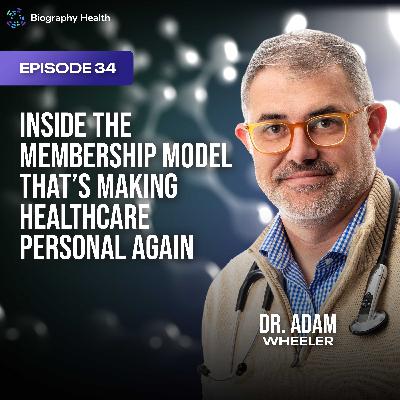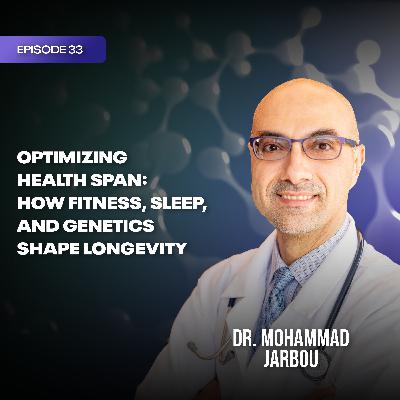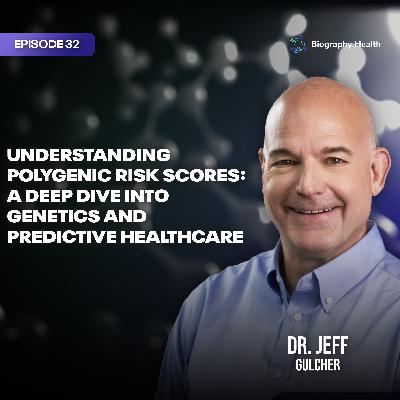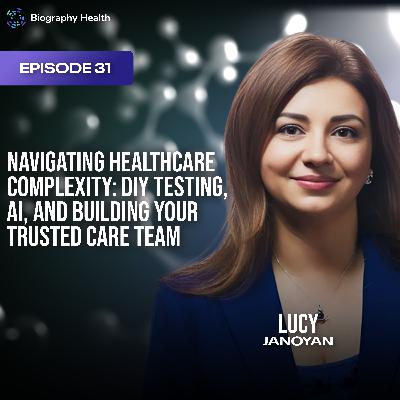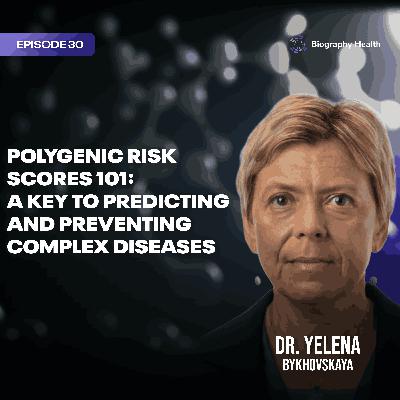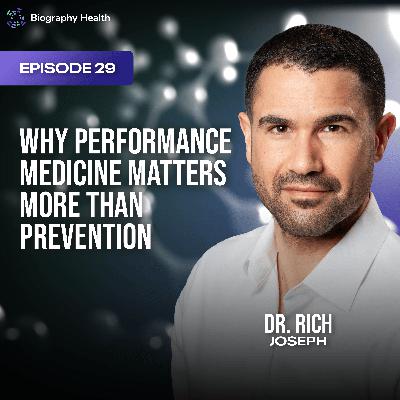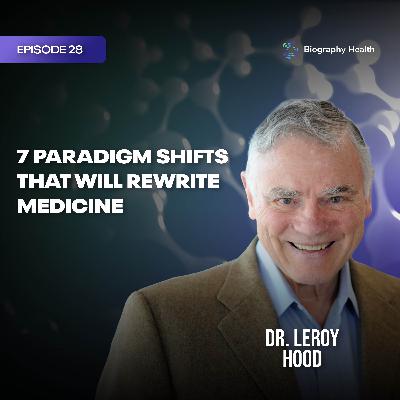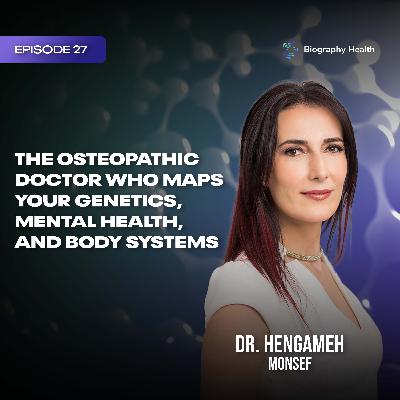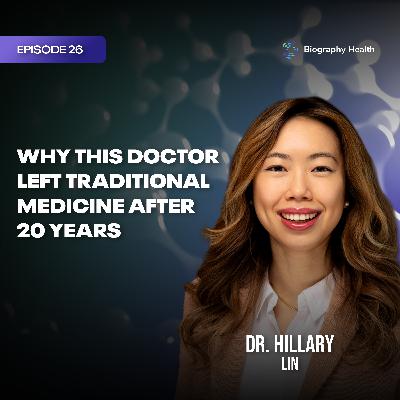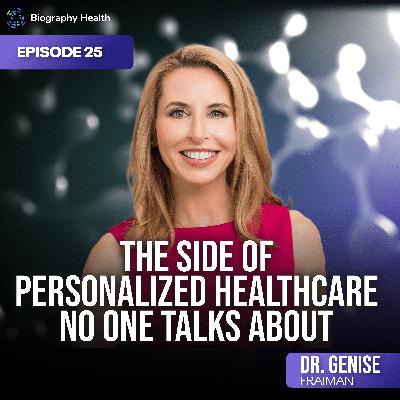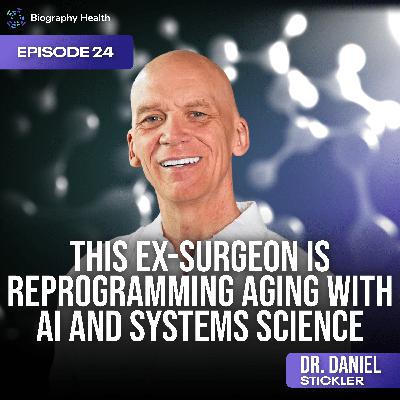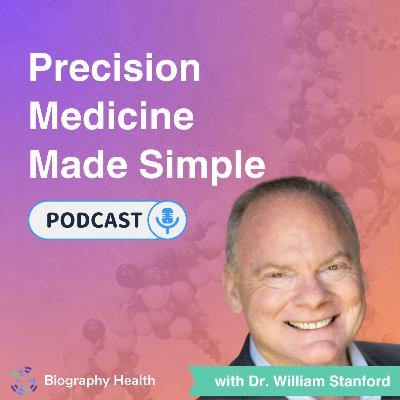Discover Precision Medicine Made Simple
Precision Medicine Made Simple

Precision Medicine Made Simple
Author: Taylor Cu
Subscribed: 4Played: 21Subscribe
Share
© Copyright 2025 Taylor Cu
Description
Welcome to the “Precision Medicine Made Simple Podcast,” where we simplify the complex world of precision medicine. We're here to explore how personalized healthcare can empower you to understand and improve your health to live a longer and healthier life. Join us as we break down the latest in medical science into actionable insights. Let's make precision medicine accessible and actionable for everyone.
Sponsored by: Biography Health, where healthcare meets personalization. With their DNAbled™ Blueprint, Biography Health empowers you with a health plan based on your unique DNA, aiming to prevent disease and extend your life. Take control of your health journey with a plan as unique as you. Visit BiographyHealth.com and start your personalized healthcare journey today.
Sponsored by: Biography Health, where healthcare meets personalization. With their DNAbled™ Blueprint, Biography Health empowers you with a health plan based on your unique DNA, aiming to prevent disease and extend your life. Take control of your health journey with a plan as unique as you. Visit BiographyHealth.com and start your personalized healthcare journey today.
34 Episodes
Reverse
The traditional healthcare system is breaking under the weight of burnout, short appointments, and profit-driven incentives, and Dr. Adam Wheeler has lived it from the inside. After losing a patient and realizing that all his creative energy was going into improving metrics instead of improving lives, he decided to build something radically different.In this episode of Precision Medicine Made Simple, recorded live at Bigtree Medical in Columbia, Missouri, Dr. Wheeler joins host Taylor Cu and co-host Dr. William Stanford to share how he reimagined primary care from the ground up. His direct primary care network now serves more than 13,000 patients with a model built on unlimited time, transparent pricing, and authentic, patient-centered relationships.You’ll hear how Dr. Wheeler’s model leverages nurse practitioners to expand access, integrates genetic and metabolic testing to personalize care, and embraces patient-requested treatments such as testosterone therapy, compounded GLP-1s, IV infusions, and preventive protocols. He also discusses how AI and shared decision-making empower patients to take control of their health, creating a system that rewards outcomes instead of volume. This conversation explores what it truly takes to make healthcare personal again and why the future of medicine belongs to those willing to rebuild it from trust, data, and compassion.Key TakeawaysWhy Dr. Wheeler walked away from the traditional insurance modelHow the direct primary care (DPC) membership system works and why patients love itThe role of nurse practitioners in solving the physician shortageHow Bigtree trains new NPs to lead with empathy and precisionWhy shared decision-making is critical to modern medicineWhat peptides, testosterone therapy, and GLP-1 medications mean for personalized careHow AI tools are empowering, not replacing, doctorsWhy genetic and metabolic testing helps patients “know the fight they’re fighting”The real difference between health span and lifespan and how to extend bothWhat the future looks like when healthcare becomes proactive instead of reactiveIn This Episode[00:00] Turning points in medicine[01:17] Intro to Precision Medicine Made Simple[02:39] Meet Dr. Adam Wheeler[05:49] Membership model explained[07:23] Bigtree care models[08:19] Scaling intimacy in care[08:48] Direct vs. concierge care[09:51] Innovative patient care[31:34] Genetics and cancer risk[33:11] Personalized medicine[34:06] Motivational interviewing[35:11] Prostate cancer and genetics[49:50] AI in healthcare[53:01] AI’s role in medicine[56:39] Bigtree Medical vision[57:48] Final thoughtsNotable Quotes[05:43] “It’s really sad that all this creative energy is going to juicing the numbers, as opposed to taking care of people.” — Dr. Adam Wheeler [05:24] “We allow our patients to leave our practice at any time. If we do a bad job, they’re supposed to leave, and if we do a good job, they stay.” — Dr. Adam Wheeler [14:27] “The direct pay model absolutely changes your incentives as a doctor… it forces you to care about the things patients actually care about.” — Dr. Adam Wheeler[38:21] “There’s nothing you can do about the Lp(a), but you need to really optimize all of your other numbers.”— Dr. Adam Wheeler[55:19] "I think before we have AI replacing me, we're gonna have me enabled with AI." — Dr. Adam WheelerOur GuestDr. Adam Wheeler is a
In this episode of Precision Medicine Made Simple, we’re joined by Dr. Mohammad Jarbou, co-founder of the Longevity Clinic. Dr. Jarbou, a board-certified physician in pulmonary medicine, critical care, sleep medicine, and clinical informatics, discusses how his clinic uses a holistic approach to aging and health span. The clinic focuses on prevention and early detection, utilizing personalized medicine, genetic testing, fitness plans, and sleep optimization.Dr. Jarbou explains how cutting-edge practices, such as VO2 max testing, personalized nutrition, and genetic evaluations, help optimize long-term health. He also highlights the importance of muscle mass and good sleep hygiene for aging well, and how these factors are integral to preventing chronic diseases.Key Takeaways:VO2 max testing is an excellent predictor of longevity and health span.Muscle mass is critical for long-term health and quality of life.Genetic testing helps guide personalized wellness plans and prevent chronic illness.Sleep hygiene plays a significant role in overall health, affecting everything from energy to metabolism.Personalized health strategies should incorporate fitness, nutrition, and genetics to achieve optimal wellness.Prevention of chronic conditions like diabetes, Alzheimer’s, and sleep apnea can be achieved with early detection and lifestyle modifications.In This Episode:[00:00] – Introduction to Dr. Mohammad Jarbou and the Longevity Clinic[05:00] – How the clinic’s focus on prevention and early diagnosis led to personalized care[10:00] – The significance of VO2 max testing and wearable technology for tracking fitness[15:00] – The importance of muscle mass and weightlifting for longevity[20:00] – The role of genetic testing in guiding personalized health strategies[25:00] – How sleep quality affects overall health and Dr. Jarbou’s tips for better sleep[30:00] – The benefits of personalized nutrition and building sustainable habits[35:00] – Addressing chronic conditions with early intervention and prevention[40:00] – Hormone replacement therapy and its role in health optimization for longevity[45:00] – How genetic testing can help identify risks for chronic diseases like Alzheimer’sNotable Quotes"Longevity is not just how long you live, but the quality of life you have along the way." – Dr. Mohammad Jarbou"Muscle mass is critical for both physical function and longevity." – Dr. Mohammad Jarbou"Prevention should be the foundation, not an afterthought, when it comes to aging and health." – Dr. Mohammad Jarbou"You can't just focus on one area of health. Fitness, nutrition, sleep, and genetics all play an essential role in how you age." – Dr. Mohammad Jarbou"Small changes in habits can have a huge impact on your longevity." – Dr. Mohammad JarbouOur GuestDr. Mohammad Jarbou is a physician with over 20 years of...
In this episode of Precision Medicine Made Simple, we’re joined by Dr. Jeff Gulcher, co-founder of Decode Genetics and current leader at Galateo Bio. Dr. Gulcher shares his vast experience in the field of genomics and precision medicine, covering everything from polygenic risk scores (PRS) to the challenges of integrating diverse genetic data into predictive healthcare.Dr. Gulcher takes us back to the early days of genetic research with Decode Genetics, where his team pioneered genome-wide association studies (GWAS) in Iceland. He dives into the development of PRS and the challenges of improving disease prediction models, especially by ensuring they are accurate across diverse populations.In addition, Dr. Gulcher discusses his personal journey with prostate cancer and how polygenic risk scores helped predict his elevated risk at an early age. The episode also covers how genomics, when combined with other clinical data, can revolutionize preventative healthcare.Key Takeaways:Polygenic risk scores (PRS) are essential in predicting the risk for diseases like cancer and cardiovascular conditions.The development of PRS is revolutionizing preventative healthcare, especially when there's no family history.Ancestry-aware PRS models are crucial, as current models are mainly based on European populations.Dr. Gulcher’s personal experience with prostate cancer demonstrates the power of early genetic screening.Combining genetic data with clinical risk factors can provide a more accurate disease risk prediction.The future of PRS lies in the integration of AI and better data representation across diverse populations.In This Episode: [00:00] – Introduction to Dr. Jeff Gulcher and the significance of polygenic risk scores[05:00] – Dr. Gulcher’s background and the founding of Decode Genetics[10:00] – How polygenic risk scores work and their application in predicting diseases[15:00] – The challenge of making PRS models work for non-European populations[20:00] – Dr. Gulcher's personal story: how early genetic testing saved his life[25:00] – The role of genetic data in determining the risk for common diseases like prostate cancer[30:00] – The importance of combining genetic risk with lifestyle factors in disease prevention[35:00] – The potential of AI in refining polygenic risk score models[40:00] – The challenges of integrating genetic data into real-world clinical practice[45:00] – How diverse genetic data will help improve precision medicine globallyNotable Quotes:“Polygenic risk scores help us understand how much our genes contribute to disease, but they are just one piece of the puzzle.” – Dr. Jeff Gulcher“Genetics isn’t destiny, but it’s an important part of the story, especially when combined with other risk factors.” – Dr. Jeff Gulcher“We need to build more inclusive data sets so that precision medicine works for everyone, not just for those of European ancestry.” – Dr. Jeff Gulcher“Personalized healthcare is about understanding each individual’s...
In this episode of Precision Medicine Made Simple, we’re joined by Lucy Janoyan, the Chief Operations Officer and Chief Strategy Officer at Biography Health. Together with Taylor Cu, Lucy dives into a wide-ranging discussion on the state of healthcare, DIY testing, and the future of personalized care.Lucy and Taylor reflect on their experience at Rosetta Fest, where they explored the complexities of the healthcare system, the growing trend of employer-sponsored healthcare, and the role of digital health platforms in improving care delivery. They also discuss the challenges of managing family health data, the importance of building trusted care teams, and the increasing role of DIY health tools and AI in the personal health journey.Through personal anecdotes, Lucy shares her perspective on how healthcare consumers are navigating the fragmented system, the need for better data transparency, and why it’s crucial to combine innovative technologies with trusted healthcare professionals.Key Takeaways:The complexities of the current healthcare system make it hard to deliver personalized care efficiently.The rise of DIY health testing and the role of AI in managing health data raises concerns around data security, accuracy, and the need for expert validation.Employers are becoming more involved in providing innovative health benefits, but challenges remain for smaller businesses in offering comprehensive plans.How fragmented health data across different systems impacts patients and caregivers, and why consolidation and integration are essential.The importance of trusted care teams and providers, even in an age of digital health platforms and self-directed care.In This Episode:[00:00] Introduction to the challenges of navigating healthcare and the role of employers in healthcare[05:00] Reflections on Rosetta Fest and the conversations around transparency, costs, and improving outcomes[10:00] The rise of DIY health testing and its impact on trust in providers and healthcare plans[15:00] How employers are evolving their healthcare offerings and the rise of self-insured companies[20:00] The importance of consolidating fragmented health data for easier patient navigation[25:00] The limits of AI in healthcare and why expert validation is still necessary[30:00] Managing family healthcare data and the importance of self-advocacy[35:00] Exploring the power of genetics in managing health risks and creating personalized care plans[40:00] The importance of having a trusted care team in the DIY health era and the future of personalized careNotable Quotes“We need to combine AI and digital health tools with trusted providers to ensure the data we’re using is accurate and impactful.” – Lucy Janoyan“More data doesn’t always equal better decisions if we don’t know how to use it. It’s about action, not just information.” – Taylor Cu“Your genes are not your destiny. We have the power to influence our health with the right information and the right team.” – Lucy Janoyan“We’re moving toward a more holistic care model,
In this episode of Precision Medicine Made Simple, we welcome back Dr. Yelena Bykhovskaya, the Chief Scientific Officer at Biography Health, for a deep dive into polygenic risk scores (PRS) and their emerging role in precision medicine. Dr. Bykhovskaya breaks down the complexities of genetics and its application in clinical practice, focusing on how polygenic risk scores can be used to assess an individual's risk for common complex diseases.We discuss the evolution of genetics in healthcare, how PRS differs from monogenic testing, and why the accuracy and predictive power of these scores are becoming increasingly important. We also address some of the challenges in applying PRS across different populations and the future potential of genetic risk scores in personalized healthcare.Key Takeaways:Polygenic risk scores are a powerful tool for assessing genetic predisposition to complex diseases like heart disease, Alzheimer’s, and more.PRS are calculated using multiple genetic variants, not just one, making them useful in understanding complex traits.While still evolving, PRS are becoming more accurate, especially with the incorporation of data from diverse populations.Understanding PRS can help prevent diseases before they manifest, offering proactive healthcare solutions.The challenges and benefits of integrating PRS into clinical practice, and how the field is rapidly advancing.In This Episode:[00:00] Introduction to polygenic risk scores and their relevance in precision medicine[05:00] How the Human Genome Project and next-generation sequencing revolutionized genetics[10:00] Explaining the difference between monogenic and polygenic diseases[15:00] The limitations of current PRS models and how they’re improving over time[20:00] Why PRS is especially useful for assessing cardiovascular risk and other common conditions[25:00] The impact of ancestral diversity on PRS and how researchers are making improvements[30:00] What it takes for PRS to move from research to clinical use[35:00] The potential for PRS to inform more personalized treatment plans[40:00] Dr. Bykhovskaya’s personal experience with blood pressure medication and how PRS could have helped[45:00] How precision medicine is changing the way we think about healthcareNotable Quotes:“Polygenic risk scores are not just about predicting the future, they’re about empowering people to take control of their health today.” – Dr. Yelena Bykhovskaya“You can't just focus on a single gene; it's about the whole picture, understanding how multiple genetic factors contribute to disease risk.” – Dr. Yelena Bykhovskaya“Genetics is a moving field, and as we gather more data, the accuracy and usefulness of PRS will continue to improve.” – Dr. Yelena Bykhovskaya“Personalized medicine is about understanding you as an individual and tailoring healthcare to your specific needs, not just your symptoms.” – Dr. Yelena BykhovskayaOur GuestDr. Yelena Bykhovskaya is the Chief Scientific Officer at Biography Health, where she...
In this episode of Precision Medicine Made Simple, we’re joined by Dr. Rich Joseph, a physician with a rare blend of expertise as both a strength and conditioning specialist and a competitive athlete. Dr. Joseph is the founder of VIM Medicine and the Board Chair of Vital Connections. He’s also a faculty member at Harvard Medical School and Brigham and Women’s Hospital, where he focuses on preventive medicine.Dr. Joseph’s unique approach integrates performance medicine, which he defines as the capacity to bring energy and attention to what matters most in life. His philosophy blends athletic mindset and proactive health practices to help people achieve peak performance in all aspects of life—physical, mental, and emotional.In this episode, we dive into his journey from athlete to physician, how he started VIM Medicine, and how performance medicine can optimize health and longevity. We also discuss the importance of mindset, recovery, and behavior in achieving long-term wellness.Key TakeawaysThe concept of performance medicine and its relevance to overall well-being.How performance-based healthcare goes beyond disease treatment to emphasize proactive, personalized care.The importance of behavioral grounding and experimentation in health optimization.How to use performance metrics like VO2 max and strength to monitor and improve health.The evolution of health insurance and its role in a more proactive, patient-centered care model.The growing field of longevity and the need for more balance in the conversation around agingIn This Episode[00:00] Introduction to Dr. Rich Joseph’s approach to performance medicine[05:15] Transitioning from athletic training to a medical career[10:00] The importance of a mindset focused on progress over perfection[14:30] Starting VIM Medicine and the integration of exercise into healthcare[20:00] The role of recovery and mindset in optimizing longevity[25:00] Exploring peptides, supplements, and managing the noise in health trends[30:00] Biomarkers: What should you focus on for long-term health?[35:00] The difference between functional medicine, longevity medicine, and personalized care[40:00] Vital Connections and the effort to address healthcare inequities in Boston[45:30] Dr. Joseph’s vision for the future of healthcare and his practice’s growthNotable Quotes“Health is an asset, something you have to strategically manage and invest over the long term.” – Dr. Rich Joseph“You can’t just treat the symptoms; you have to optimize performance to live well.” – Dr. Rich Joseph“Prevention is not sexy, but performance is something everyone can get behind.” – Dr. Rich Joseph“You have to pair stimulus with recovery to create adaptation.” – Dr. Rich JosephOur GuestDr. Rich Joseph is a Harvard-trained internist, founder of VIM Medicine, and Chief Medical Officer at Restore Hyper Wellness. With a background in strength and conditioning, he has created a unique model of Performance Medicine that combines athletic principles with healthcare. His approach emphasizes proactive health strategies, personalized wellness, and performance optimization. Dr. Joseph also leads Vital Connections, a nonprofit focused on improving health equity and community well-being.Resources and LinksDr. Rich Josephhttps://www.linkedin.com/in/rich-joseph-md-mba-61448b33a/
Most of today’s healthcare still treats problems after they happen. Dr. Leroy Hood thinks that needs to change. In this episode of Precision Medicine Made Simple, he explains how genomics, regular health tracking, and AI can shift the focus to preventing disease before it starts. Dr. Hood is one of the scientists who helped build the automated DNA sequencer that powered the Human Genome Project. He also founded the Institute for Systems Biology. He has worked across research, government, and healthcare to push ideas that were unpopular at the time but are now standard practice. You’ll hear how he went from a professor at Caltech to building new departments, starting research institutes, and working with governments around the world to change how healthcare works. He also explains the idea of P4 medicine: predictive, preventive, personalized, and participatory care and why most of the healthcare system isn’t built to support it yet.Key TakeawaysSeven shifts that shaped Dr. Hood’s career and could change medicineWhy most healthcare money goes to chronic disease and how to cut thatHow genome and phenome data can find diseases years before symptomsWhat polygenic risk scores mean for different ethnic groupsHow AI helps doctors create personalized care plansHow useful data can slow aging, prevent Alzheimer’s, and support your healthWhy chasing profits slows down U.S. healthcareHow kids in Seattle learn to manage their own healthWhy commercial insurance may fail if it doesn’t adaptHow Tom Brady trained his brain to last longer and how you can apply thatIn This Episode[00:00] Introduction to Dr. Leroy Hood's journey[01:49] The evolution of precision medicine[03:11] Introducing Dr. Leroy Hood[04:41] Dr. Hood's early career and challenges[06:43] The birth of systems biology[08:20] Pioneering cross-disciplinary research[10:56] The Human Genome Project[13:49] Establishing systems biomedicine[22:51] The Luxembourg initiative[23:45] Data-driven health insights[30:42] Challenges with polygenic risk scores[31:42] Ancestry and genetic variants[32:52] Pharmacogenomics and drug response[33:16] Rare diseases and carrier status[34:57] Lifestyle genetics and athletic injuries[36:18] Actionable possibilities in genomics[38:27] Economic impact of chronic disease prevention[39:04] Obstacles to deep health analysis[40:48] Advancements in personalized medicine[45:50] The future of health care and AI[56:15] Brain health and cognitive function[59:39] Conclusion and future topicsNotable Quotes[00:00:39] "I decided “Big Data” was necessary to deconvolute the complexity of human biology. But the instrumentation for “Big Data” didn't exist at that point in time." — Dr. Leroy Hood[00:11:41] "The big science of the genome project revolutionized so many fields of biology in profound ways that it's really quite remarkable." — Dr. Leroy Hood[00:12:15] "The Human Genome absolutely transformed our understanding of how we can think about human biology." — Dr. Leroy Hood[00:13:39] "If you really want to have fun with science, you can't do it at a place where people are criticizing two of the major thrusts in your laboratory." — Dr. Leroy Hood[00:44:14] "Over the last 40 years, Americans extended their lifespan by 10 years. They didn't expand their health span by a single year." — Dr. Leroy...
What does it really take to solve the medical mysteries most doctors dismiss? In this episode of Precision Medicine Made Simple, we sit down with Dr. Hengameh Monsef, DO, an internal medicine physician trained in high-acuity care, now reinventing how we treat chronic and complex illness through concierge precision medicine at Ascending Medicine. She shares her journey from Iran to the U.S., from frustrated hospitalist to data-powered detective. We dive into how whole genome sequencing, pharmacogenetics, and old-school osteopathic wisdom come together in her practice and why some of the most impactful tools, like lymphatic drainage and myofascial release, are still off the radar in mainstream care. This is a must-listen for clinicians rethinking their practice, patients frustrated by the status quo, and anyone curious about the intersection of science, culture, behavior, and care.Key TakeawaysWhy Dr. Hengameh Monsef left the hospital system after 20 yearsThe surprising science behind “alternative” practices like lymphatic drainage and fascia workHow she balances whole genome data with patient preference, culture, and complianceWhat AI can’t replace in clinical decision-making (yet)Why pharmacogenetics saves lives and should be routine, not optionalHow concierge medicine works and why younger doctors shouldn’t rush into itThe role of genetics in mental health, depression, and drug sensitivityWhat needs to change in politics and insurance for precision medicine to scaleIn This Episode[00:00] Introduction to experience in medicine and AI[00:54] Welcome to Precision Medicine Made Simple[02:17] Meet Dr. Hengameh Monsef[03:25] Dr. Monsef' journey to medicine[07:06] The philosophy of osteopathic medicine[10:08] Challenges and rewards of concierge medicine[18:01] Personalized medicine and patient care[23:06] Exploring holistic and alternative therapies[27:53] The dangers of sitting: why movement matters[29:15] Holistic lifestyle interventions for chronic diseases[29:51] Personalized medicine: the role of whole genome sequencing[30:28] Understanding genetic variants and chronic conditions[32:07] Acupuncture and genetic differences[33:11] Screening for mental health issues[34:23] Genetic links to depression and anxiety[34:49] The importance of pharmacogenetics[36:47] Challenges in traditional medicine and the role of AI[40:10] The future of personalized medicine and patient empowerment[46:49] Insurance companies and market forces[48:56] The role of patients in shaping healthcare[56:16] Advice for female immigrant physician entrepreneurs[57:00] Conclusion and contact informationNotable Quotes[08:38] "I think the more data we have, it's going to direct medicine to maybe a different route that are currently being taught in traditional medical schools." — Dr. Hengameh Monsef[10:54] "When you become a physician, just that career is dedication. So I feel I'm dedicated to the patient. So it makes it even harder to balance family." — Dr. Hengameh Monsef[11:23] "Why concierge medicine is growing is by just the fact that you're concierge, you tend to keep lower numbers. By lower numbers, you decrease the number of emergencies that could happen in a day." — Dr. Hengameh Monsef[13:25] "If you're graduating early, it's not a good idea to do concierge medicine because you have to put some experience that, that learning that comes with experience." —Dr. Hengameh Monsef[56:16] "I think first generation immigrant automatically most of them...
What if your doctor could predict what will kill you—before it ever becomes a problem? In this episode of Precision Medicine Made Simple, we dive into the evolving landscape of longevity medicine and health AI with Dr. Hillary Lin, Stanford-trained internist, former oncologist, and co-founder of CareCore—a platform empowering wellness creators and brands to offer doctor-supervised, data-driven care. Dr. Lin shares her personal journey from frustration with traditional medicine to building one of the most forward-thinking longevity platforms today. She discusses how we can sift through misinformation, integrate wearables, genetics, and proteomics, and balance the promise of AI with the human art of medicine. If you're interested in the intersection of tech, behavior change, and personalized healthcare—or you're a clinician navigating this fast-changing world—this episode is a must-listen.Key TakeawaysWhy Dr. Lin walked away from oncology—and what that revealed about the limits of traditional medicineHow AI is helping doctors make sense of overwhelming health data (without replacing the human touch)Why behavior change—not biomarkers—is still the hardest challenge in longevity careWhat whole genome sequencing and proteomics are uncovering about health risk (and why family history still matters)How mental health is shaped by biology, not just emotions—and what that means for future treatmentsWhy “more data” isn’t always better—and how the art of medicine guides what we actually do with itHow CareCore is bringing doctor-backed longevity tools to wellness creators, gyms, and health brandsWhy longevity medicine must balance innovation with scientific rigor—and where influencers can help or hurtIn This Episode[00:00] Dr. Lin’s background and intro to the show[01:02] Leaving traditional medicine: oncology frustrations[07:07] Curiosity, questioning incentives, and systemic change[14:30] Wearables, data overwhelm, and near-future care[19:21] Will AI replace doctors? Not likely—here’s why[25:27] Behavior change, accountability, and lifestyle compliance[28:40] Why common advice still matters—but needs personalization[32:56] Dr. Lin’s take on Brian Johnson’s biohacking movement[36:33] The importance of community and mental health in longevity[43:39] Gut-brain connection and biological drivers of mental health[47:01] How to build a personalized longevity baseline[50:23] Genomics vs. real-world outcomes: a case study in family history[55:44] AI-enabled care and the future of CareCore[59:20] Influencer health, B2B partnerships, and responsible contentNotable Quotes[01:02] "I realized somewhere along the way that I couldn't be a doctor in today's system and do the things that I hope to do. You have to maintain the mind of a child always in that you're asking why?" — Dr. Hillary Lin[01:38] "Behavior change is the number one, most important and hardest thing to achieve. I think the art part of medicine is really knowing what to do with incomplete knowledge." — Dr. Hillary Lin[08:09] "The curiosity was so important because it makes you push past a lot of deterrence... you have to really dig past that by continuously asking, well, why is it that way?" — Dr. Hillary Lin[21:46] "I think there will always be a place for doctors slash healers. And the reason is humans love other humans." — Dr. Hillary Lin[29:48] "I think the art part of medicine is really knowing what to do with incomplete knowledge.I always say start with figuring out what will kill you first.”— Dr. Hillary Lin[34:55] "I think people should be re-energized about lifestyle changes. It's not new, but if he makes it seem like it's new, then cool, that's...
In this episode of Precision Medicine Made Simple, hosts Dr. William Stanford and Taylor Cu sit down with Dr. Genise Fraiman, founder of Ascending Medicine and a trailblazer in concierge care. With over two decades of experience—from co-founding one of Cedars-Sinai’s top hospitalist groups to mentoring young physicians—Dr. Fraiman shares her personal and professional evolution toward a more human, proactive approach to medicine.Together, they unpack the pressures of traditional practice, the emotional toll of hospital work, and Dr. Fraiman’s deeply personal experience navigating breast cancer risk without the genomic tools we now have at our fingertips. She also reveals how treating sleep apnea transformed her own health—and why even “healthy” patients shouldn’t ignore it.This candid, wide-ranging conversation explores the promise (and pitfalls) of AI in healthcare, the art of vetting medical information, and what it really takes to start a concierge or precision-focused practice today. At its core, this episode is about reimagining the doctor-patient relationship—and reclaiming time, trust, and tailored care.Key TakeawaysThe untold toll of hospital-based medicine—and why Fraiman finally left it behindWhat concierge care actually looks like in practice (and why it matters)Why time is the most underrated tool in patient careDr. Fraiman’s decision to undergo a prophylactic mastectomy—and the missing genomic data that could’ve changed it allHow sleep apnea affects even lean, fit patients—and how CPAP changed her healthWhat patients should know about supplements, pseudoscience, and AI misinformationHow to vet a personalized medicine provider—and why the right “fit” matters more than everDr. Stanford’s bold prediction: commercial health insurance will collapse within 10 yearsIn This Episode[00:00] Introduction and initial questions[00:59] Welcome to the podcast[01:07] Guest introduction: Dr. Genise Fraiman[01:55] Early career and meeting Dr. Stanford[04:07] Building a hospitalist group[04:34] Transition to concierge medicine[05:52] Challenges and rewards of concierge medicine[07:13] Personalized patient care[13:50] Proactive vs. reactive medicine[19:47] Personal health journey and genetic risks[29:48] Sleep study reflections[30:11] Challenges and adjustments with CPAP[31:21] Exploring alternative treatments[33:00] Navigating medical information and supplements[38:02] The role of AI in healthcare[42:44] Starting a concierge medical practice[46:58] Insurance and healthcare costs[52:32] Privacy concerns with genetic testing[55:28] Finding the right medical provider[57:42] Conclusion and contact informationNotable Quotes[07:28] "What I found is I've been on all sides. I've been the patient, I've been the physician, I've been the family member. And it's a really horrible feeling to feel helpless in any of those situations."— Dr. Genise Fraiman[14:33] “I think we were taught to be really great at being reactive physicians. But if we can take that same knowledge and be proactive—change the trajectory—that’s the name of the game.” — Dr. Genise Fraiman[24:53] “If I had the genetic information then that I have now, the decision around my mastectomy would’ve been far less agonizing.” — Dr. Genise Fraiman[27:50] “I failed my sleep study miserably… and I’m 5’3”, fit, and healthy. You can’t ignore the data.” — Dr. Genise FraimanOur Guest Dr. Genise FraimanFounder of Ascending Medicine, Dr.Fraiman brings...
We’re living in the age of health data overload—but how do you turn all those insights into real-life transformation? This episode of Precision Medicine Made Simple features Dr. Daniel Stickler, former vascular surgeon turned systems medicine pioneer, who’s leading the charge in longevity, AI-powered diagnostics, and cutting-edge clinical tools.In this candid conversation with hosts Dr. Stanford and Taylor, Dr. Stickler opens up about the moment he walked away from surgery for good—and how it led to building an entirely new model of medicine. From continuous glucose monitors to full genome sequencing, from peptides to personalized AI agents, Dr. Stickler shares the emerging tools that are empowering both doctors and patients to move from disease management to proactive health optimization.Whether you're a healthcare provider, tech innovator, or simply a wellness-curious listener, this episode will challenge your assumptions and give you a vision for the future of truly personalized care.Key TakeawaysWhy most modern medicine is built around postponing death, not optimizing lifeHow wearables like Garmin and UltraHuman reveal individual patterns (and change behavior fast)The overlooked power of epigenetics—and why lifestyle still rules your genesWhat peptides like BPC-157 and GLP-1 analogs are doing for healing, inflammation, and gut healthHow Dr. Stickler uses AI to process patient data and create 50-page system-based care plans in minutesWhy “root cause” medicine might be an outdated myth—and what’s nextIn This Episode[00:00] Introduction [00:14] Guest introduction: Dr. Daniel Stickler[01:00] Dr. Stickler's journey into medicine[03:19] Integrating wearable technology in medicine[05:39] The impact of wearables on patient care[12:38] Genetics and epigenetics in medicine[22:21] Systems-based medicine explained[27:08] The role of peptides in modern medicine[30:58] Introduction to GLP-1 peptides[31:30] Benefits and fine-tuning of semaglutide[32:35] Exploring BPC-157 for recovery[33:51] Oral vs. injectable BPC-157[35:05] Potential downsides of BPC-157[36:44] Wearable technology and recovery[38:19] The future of medicine: AI and personalized care[56:17] The role of physicians in the AI era[57:17] Concerns about over-reliance on technology[58:46] Recommended resources for providers and patients[01:01:19] FDA's role in approving medical advancements[01:03:42] Exosomes and young plasma therapy potentialOur GuestDr. Daniel Stickler is the Co-Founder and Chief Medical Officer of Apeiron Zoh and Mosaic Biodata, where he integrates wearable tech, AI, peptides, genetics, and systems thinking into personalized healthcare. A former high-volume surgeon, he now trains clinicians globally in longevity and performance medicine. He's also an advisor to Google and a recognized thought leader in human enhancement and optimization.Resources and LinksDr. Daniel SticklerApeiron CenterLinkedInSubstackTaylor CuCaptivate.FMLinkedIn
The Former ER Doctor Challenging How We Practice Medicine w/Dr. Sukhjit "Sarge" TakharPrimary-MD.comEmail: drtakhar@primary-md.comTakeawaysDr. Takhar emphasizes the importance of understanding the patient as a person.Concierge medicine allows for more personalized and attentive care.The healthcare system often limits the time doctors can spend with patients.AI can assist in healthcare but cannot replace the human connection.Precision medicine focuses on individual patient needs rather than population averages.The integration of advanced diagnostics is crucial for effective patient care.Healthcare professionals must navigate the challenges of the current system.There is a growing need for democratization of advanced medical care.Patients should be encouraged to take an active role in their health decisions.The future of medicine will likely involve more personalized and preventive approaches.SummaryIn this episode of the Precision Medicine Made Simple podcast, hosts Taylor Cu and Dr. William P. Stanford engage with Dr. Sukjit "Sarge" Takhar, a pioneer in concierge medicine. They discuss the evolution of healthcare, the challenges faced by practitioners, and the importance of personalized patient care. Dr. Takhar shares his journey from traditional medicine to a more individualized approach, emphasizing the role of advanced diagnostics and the integration of AI in healthcare. The conversation highlights the need for a human connection in medicine, the significance of understanding patient backgrounds, and the future of precision medicine as it becomes more accessible and affordable. The episode concludes with advice for aspiring medical entrepreneurs and a discussion on the intersection of science and patient care.Chapters00:00 The Journey Begins: Personal Stories and Connections02:32 From Traditional Medicine to Concierge Care06:36 The Shift Towards Precision Medicine10:50 Challenges and Opportunities in Healthcare14:57 The Future of Health Monitoring and Diagnostics25:57 Vitalist Bay: A Progressive Longevity Conference26:23 Buyer Beware: Navigating Longevity Medicine Hype27:37 Understanding Conflicts of Interest in Longevity Research28:30 Metabolic Health: The Crisis and Its Implications29:57 The Role of Direct-to-Consumer Tests in Health Decisions31:42 Precision Medicine: Personalizing Health Strategies33:21 AI in Medicine: The Human Advantage35:33 The Evolution of AI in Healthcare37:31 AI and Human Connectivity in Medicine39:58 The Future of AI in Patient Care47:53 Navigating AI Regulations in Healthcare50:33 Advice for Aspiring Medical Entrepreneurs51:19 The Challenges of Building a Practice53:00 Staying Current in Medicine56:20 The Importance of Precision Medicine01:01:25 Personalized Health Recommendations01:07:55 Building Trust with Patients01:13:43 Navigating the Landscape of Health Claims01:16:14 PMMS - New Outro - No Music.mp4Dr. William Stanford MD PHD FACPdrstanford@bhipm.comDr. William Stanford is co-founder of Biography Health. He began his career as a mechanical and aerospace engineer at Texas Instruments in 1982 while also pursuing his interest in aviation as a flight instructor and commercial pilot. In 1991, he pivoted into biomedical science and subsequently completed the combined M.D./Ph.D. physician-scientist training program at the University of California, Los Angeles, in 1998 and an internal medicine residency at UCLA in 2001. He is board-certified in internal medicine and is a Fellow of the American College of Physicians.A pioneer in the field of...
In this episode, Dr. David Moskowitz shares how thousands of patients have avoided dialysis through genomic medicine — and why most kidney failure is preventable.We dive deep into ACE genes, repurposed drugs like quinapril and ProGraph, and explore what genomic insights could mean for diseases like Alzheimer's and cancer.Heads up: this one gets detailed with a lot of medical terminology. If you're curious but lost, drop the transcript into ChatGPT — it'll help translate the science.Dr. David Moskowitz - genomed.comTakeawaysDialysis is preventable, and awareness is crucial.Innovative approaches can challenge traditional medical practices.ACE inhibitors should be the first line of defense in kidney health.Genetic factors play a significant role in Alzheimer's disease.Whole genome sequencing can provide insights into various diseases.Repurposing existing drugs may offer new treatment avenues.The healthcare system often resists change due to financial incentives.Public health initiatives need to focus on improving outcomes.Understanding the molecular basis of diseases can lead to better treatments.Collaboration and communication in medicine are essential for progress.Chapters00:00 Introduction to Preventive Medicine and Genomics04:53 The Journey to Preventing Kidney Disease07:35 Innovations in Kidney Health: The Role of ACE Inhibitors10:14 Challenges in the Healthcare System12:45 The Impact of Lifestyle on Kidney Health15:38 Exploring the Connection Between COVID-19 and Kidney Disease17:50 The Future of Genomics in Preventive Medicine20:10 Patient Empowerment and Navigating Healthcare22:57 Key Takeaways39:31 Exploring Whole Genome Sequencing in Alzheimer's42:16 Iron Overload and Neurodegeneration46:36 mTOR Pathway and Alzheimer's Treatment48:29 Repurposing Drugs for Alzheimer's and Other Neurodegenerative Diseases55:09 Genetic Risk Factors for Alzheimer's57:00 Innovations in Cancer Detection01:02:47 Differentiation Therapy in Cancer Treatment01:08:38 The Importance of Personalized HealthDr. William Stanford MD PHD FACPdrstanford@bhipm.comDr. William Stanford is co-founder of Biography Health. He began his career as a mechanical and aerospace engineer at Texas Instruments in 1982 while also pursuing his interest in aviation as a flight instructor and commercial pilot. In 1991, he pivoted into biomedical science and subsequently completed the combined M.D./Ph.D. physician-scientist training program at the University of California, Los Angeles, in 1998 and an internal medicine residency at UCLA in 2001. He is board-certified in internal medicine and is a Fellow of the American College of Physicians.A pioneer in the field of hospital medicine, Dr. Stanford founded and led a 25-physician group of private practice hospitalists at Cedars-Sinai Medical Center in Los Angeles in 2002. After an extensive clinical career as the attending physician for over 100,000 patients, he was elected by his peers at Cedars-Sinai to be clinical chief of general internal medicine, serving in this capacity from 2017 to 2018. Inspired by recent advancements in biomedical science and medicine, Dr. Stanford completed professional certification through Stanford University’s Department of Genetics in 2018, further advancing his role as a true physician-scientist. Since 2018, he has provided genomic and precision medicine consultations through the Beverly Hills Institute for Precision Medicine, enhancing his role as a leading expert in the field.Sponsored by: Biography HealthThis episode is sponsored by Biography Health — where DNA-powered healthcare is designed just for you. Biography Health is
In this episode, Dr. Stanford, Lucy Janoyan, and Taylor Cu reflect on key takeaways from the Precision Medicine World Conference — from AI’s role in understanding disease to the future of polygenic risk scores. They discuss the challenges of data validity, patient privacy, and the evolving role of patients and providers in a tech-driven healthcare landscape, including a highlight from NVIDIA CEO Jensen Huang on how AI is set to reshape the future of medicine.TakeawaysThe conversation around precision medicine has evolved significantly since 2019.AI is transforming patient care and the practice of medicine.The PMWC provided a more intimate setting for meaningful discussions.There is a growing concern about the ethical implications of AI in healthcare.The transition from research to clinical practice is crucial for precision medicine.Economic factors play a significant role in the adoption of precision medicine.Digital twins could revolutionize personalized healthcare.Data privacy and patient ownership are critical issues in genomic sequencing.The insurance industry faces challenges in adapting to precision medicine.The future of healthcare will be dramatically different in the next decade.Chapters00:00 Introduction to Precision Medicine and Conference Insights05:22 Evolution of Precision Medicine Discussions08:30 AI's Role in Healthcare Transformation11:35 Challenges in Data Validity and Clinical Adoption14:17 The Future of Polygenic Risk Scores17:27 Optimism vs. Pessimism in Precision Medicine20:26 Insurance and Healthcare Delivery Paradigms23:31 Digital Twins and Their Impact on Precision Medicine41:44 The Future of AI in Medicine44:56 Understanding Aging and Disease Pathways46:54 The Role of AI in Autonomous Science48:40 Holistic and Precision Medicine52:49 Data Privacy and Patient Governance56:55 Concerns Over Genome Sequencing01:02:13 The Global Landscape of Genomic Data01:05:42 The Democratization of Precision Medicine01:43:32 Introduction to Precision Medicine01:43:32 The Importance of Personalized HealthDr. William Stanford MD PHD FACPdrstanford@bhipm.comDr. William Stanford is co-founder of Biography Health. He began his career as a mechanical and aerospace engineer at Texas Instruments in 1982 while also pursuing his interest in aviation as a flight instructor and commercial pilot. In 1991, he pivoted into biomedical science and subsequently completed the combined M.D./Ph.D. physician-scientist training program at the University of California, Los Angeles, in 1998 and an internal medicine residency at UCLA in 2001. He is board-certified in internal medicine and is a Fellow of the American College of Physicians.A pioneer in the field of hospital medicine, Dr. Stanford founded and led a 25-physician group of private practice hospitalists at Cedars-Sinai Medical Center in Los Angeles in 2002. After an extensive clinical career as the attending physician for over 100,000 patients, he was elected by his peers at Cedars-Sinai to be clinical chief of general internal medicine, serving in this capacity from 2017 to 2018. Inspired by recent advancements in biomedical science and medicine, Dr. Stanford completed professional certification through Stanford University’s Department of Genetics in 2018, further advancing his role as a true physician-scientist. Since 2018, he has provided genomic and precision medicine consultations through the Beverly Hills Institute for Precision Medicine, enhancing his role as a leading expert in the field.Sponsored by: Biography HealthThis episode is sponsored by Biography Health — where DNA-powered healthcare is designed just for you. Biography Health is a HIPAA-compliant precision...
Podcast Suggestion Survey
When Genes Collide: A Rare Diagnosis Reveals Complex Health Interactions with Dr. Philip BretskyFor this episode, Dr. Bretsky shares a remarkable case study that unravels the complex relationship between genes and inflammation. When a patient's mysterious symptoms led to the rare diagnosis of VEXAS syndrome, it revealed an unexpected connection with cardiovascular health, demonstrating how different genetic factors can interact to amplify health risks.Timestamps:3:50 - Introduction to Lp(a) and its role in cardiovascular health10:09 - Patient's initial presentation with testicular swelling17:55 - Discussion of environmental factors and genetic mutations23:28 - Understanding inflammation's role in cardiovascular risk35:32 - Treatment decisions and stent placement41:51 - Prevention strategies for inflammatory conditions1:24:19 - Episode wrap-up and closingDr. Philip Bretsky's Contact Information:Philip M. Bretsky MD PhD MPH FACP1301 20th Street, Suite 230Santa Monica, CA 90404TEL: 310.828.4411FAX: 310.828.2411Facebook:@santamonicaprimarycareTwitter / X: @santa_careInstagram: @santa_monica_primary_careWeb: www.drbretsky.com & www.santamonicaprimarycare.comMy monthly newsletter: https://lp.constantcontactpages.com/su/JtF9zzRDr. William Stanford MD PHD FACPDr. William Stanford is co-founder of Biography Health. He began his career as a mechanical and aerospace engineer at Texas Instruments in 1982 while also pursuing his interest in aviation as a flight instructor and commercial pilot. In 1991, he pivoted into biomedical science and subsequently completed the combined M.D./Ph.D. physician-scientist training program at the University of California, Los Angeles, in 1998 and an internal medicine residency at UCLA in 2001. He is board-certified in internal medicine and is a Fellow of the American College of Physicians.A pioneer in the field of hospital medicine, Dr. Stanford founded and led a 25-physician group of private practice hospitalists at Cedars-Sinai Medical Center in Los Angeles in 2002. After an extensive clinical career as the attending physician for over 100,000 patients, he was elected by his peers at Cedars-Sinai to be clinical chief of general internal medicine, serving in this capacity from 2017 to 2018. Inspired by recent advancements in biomedical science and medicine, Dr. Stanford completed professional certification through Stanford University’s Department of Genetics in 2018, further advancing his role as a true physician-scientist. Since 2018, he has provided genomic and precision medicine consultations through the Beverly Hills Institute for Precision Medicine, enhancing his role as a leading expert in the field.Sponsored by: Biography HealthBiography Health, where healthcare meets personalization. With their DNAbled™ Blueprint, Biography Health empowers you with a health plan based on your unique DNA, aiming to prevent disease and extend your life. Take control of your health journey with a plan as unique as you. Visit BiographyHealth.com and start your personalized healthcare journey today.Other Resources Mentioned:https://www.cnn.com/2023/01/24/health/vexas-syndrome-prevalence-study-wellness/index.html
Beauty Span and Health Span: Where Aesthetics Meets Longevity with Dr. Cory GoldbergFor this episode, we dive deep into the intersection of aesthetics and longevity with Dr. Cory Goldberg, a renowned plastic and craniofacial surgeon. Dr. Goldberg bridges the art of aesthetic medicine with the science of precision medicine, sharing groundbreaking insights on how oxidative stress affects both beauty and overall health, and discussing innovative approaches to extending both beauty span and health span.Timestamps:03:27:24 - Dr. Goldberg shares his background and journey from physiology to plastic surgery to precision medicine23:31:24 - Deep discussion on senescent cells (zombie cells) and their impact on aging and health35:13:13 - Exploration of the gut-skin-brain axis and microbiome connections43:51:24 - Detailed explanation of reactive oxygen species (ROS) and their role in aging57:46:07 - Discussion of GliSODin supplement and superoxide dismutase1:18:52:13 - Dr. Goldberg's insights on diet, plant-based eating, and oxidative stress1:27:27:15 - Overview of Dr. Goldberg's practice evolution and his vision for integrating longevity medicine with aesthetic medicineDr. Cory Goldberghttps://www.linkedin.com/in/corygoldbergmd/https://www.corygoldbergmd.com/https://www.instagram.com/drcorygoldbergmd/Dr. Cory S. Goldberg BSc, MD, MASc, FRCS(C), FACS, MBA is a Plastic Surgeon with a fellowship in the Royal College of Physicians and Surgeons of Canada. He is a diplomat of the American Board of Plastic Surgeons and is also a Fellow of the American College of Surgeons. He earned his MD degree from Queen’s University, Canada and completed his Plastic Surgery residency training at the University of Toronto, including a Master’s of Applied Science in Biomedical Engineering. He subsequently did sub-specialty fellowship training in Craniofacial Plastic Surgery at University of Southern California in Los Angeles, California.Dr. William Stanford MD PHD FACPdrstanford@bhipm.comDr. William Stanford is co-founder of Biography Health. He began his career as a mechanical and aerospace engineer at Texas Instruments in 1982 while also pursuing his interest in aviation as a flight instructor and commercial pilot. In 1991, he pivoted into biomedical science and subsequently completed the combined M.D./Ph.D. physician-scientist training program at the University of California, Los Angeles, in 1998 and an internal medicine residency at UCLA in 2001. He is board-certified in internal medicine and is a Fellow of the American College of Physicians.A pioneer in the field of hospital medicine, Dr. Stanford founded and led a 25-physician group of private practice hospitalists at Cedars-Sinai Medical Center in Los Angeles in 2002. After an extensive clinical career as the attending physician for over 100,000 patients, he was elected by his peers at Cedars-Sinai to be clinical chief of general internal medicine, serving in this capacity from 2017 to 2018. Inspired by recent advancements in biomedical science and medicine, Dr. Stanford completed professional certification through Stanford University’s Department of Genetics in 2018, further advancing his role as a true physician-scientist. Since 2018, he has provided genomic and precision medicine consultations through the Beverly HillsSponsored by: Biography...
From Flight Medic to Precision Medicine with Dr. Kat SchmollyIn this episode, we're joined by Dr. Kat Schmolly. From her adventurous past as an Air Force Flight Medic to her current mission revolutionizing rare disease diagnosis, Dr. Schmolly shares her unique journey into precision medicine. We discuss why bringing personalized care to the frontlines of medicine is crucial, and explore how innovative technologies can transform the future of healthcare.Timestamps:2:58 - How Dr. Schmolly and Dr. Stanford connected over precision medicine7:35 - Early observations of environmental impacts on military health13:22 - The near-disaster flight mission that changed her path26:43 - Why precision medicine stays in research vs clinical practice43:58 - Starting ZebraMD to transform rare disease diagnosis47:19 - Vision for bringing precision medicine to primary careDr. Kat Schmollylinkedin.com/in/kat-schmollykschmolly@gmail.comDr. Kat Schmolly is a physician at Dartmouth Health, combining her clinical expertise with a passion for advancing personalized medicine. As the founder of ZebraMD, she focuses on innovative solutions for rare disease diagnostics through algorithm development and AI-powered clinical tools. A graduate of the David Geffen School of Medicine at UCLA, her work has included groundbreaking research in genetic and rare diseases.Before pursuing medicine, Dr. Schmolly served as a flight medic in the United States Air Force, where she honed her skills in aerospace and critical care medicine. With experience ranging from cardiac R&D at Medtronic to porphyria research and precision medicine development, Dr. Schmolly continues to lead efforts that bridge cutting-edge technology with patient-centered care.Dr. William Stanford MD PHD FACPdrstanford@bhipm.comDr. William Stanford is co-founder of Biography Health. He began his career as a mechanical and aerospace engineer at Texas Instruments in 1982 while also pursuing his interest in aviation as a flight instructor and commercial pilot. In 1991, he pivoted into biomedical science and subsequently completed the combined M.D./Ph.D. physician-scientist training program at the University of California, Los Angeles, in 1998 and an internal medicine residency at UCLA in 2001. He is board-certified in internal medicine and is a Fellow of the American College of Physicians.A pioneer in the field of hospital medicine, Dr. Stanford founded and led a 25-physician group of private practice hospitalists at Cedars-Sinai Medical Center in Los Angeles in 2002. After an extensive clinical career as the attending physician for over 100,000 patients, he was elected by his peers at Cedars-Sinai to be clinical chief of general internal medicine, serving in this capacity from 2017 to 2018. Inspired by recent advancements in biomedical science and medicine, Dr. Stanford completed professional certification through Stanford University’s Department of Genetics in 2018, further advancing his role as a true physician-scientist. Since 2018, he has provided genomic and precision medicine consultations through the Beverly HillsSponsored by: Biography HealthBiography Health, where healthcare meets personalization. With their DNAbled™ Blueprint, Biography Health empowers you with a health plan based on your unique DNA, aiming to prevent disease and extend your life. Take control of your health journey with a plan as unique as you.
A Doctor's Mission: How Dr. Scoles Used Genetics to Transform Patient Care with Dr. Lyndell ScolesIn this episode, we explore pharmacogenomics, also known as genetic pharmaceutical profiling with Dr. Lyndell Scoles with MDVIP. He’s an early pioneer in using genetic testing to optimize medication choices. With over 30 years of experience in internal medicine, Dr. Scoles shares how genetic pharmaceutical profiling helps determine which medications will work best for each patient based on their unique genetic makeup. He presents compelling examples of how this approach has prevented hospitalizations and improved patient outcomes, including cases of heart failure prevention and depression treatment. We also discuss why this hasn't been widely adopted yet in medical practice, despite its potential to save billions in healthcare costs.Note: As our first in-person recording, you may notice some echo and compressed audio quality in portions of the conversation - we appreciate your understanding as we continue to improve our in-person recording setup.Timestamps:00:02:49 - Dr. Scoles begins explaining his journey into pharmacogenomics and why he started implementing it in his practice00:08:28 - Description of how genetic testing is done through cheek swabs and the three-category report system00:25:30 - Powerful patient case study about adjusting antidepressant dosing based on genetic testing00:29:54 - Discussion of Metoprolol case studies and the 8% of patients who can't metabolize it properly00:45:34 - Moving patient story about treating a 13-year ulcer patient successfully using genetic insights00:50:35 - Resources for physicians to learn more about pharmacogenomics00:52:43 - Contact information and closing thoughtsDr. Lyndell Scoles5734246494https://www.mdvip.com/doctors/lyndellscolesmddrscoles@socket.netDr. Lyndell Scoles is a dedicated MDVIP-affiliated physician with over three decades of experience in internal medicine, renowned for his compassionate, patient-centered approach to healthcare. A strong advocate for personalized medicine, Dr. Scoles has integrated pharmacogenomics—also known as genetic pharmaceutical profiling—into his practice, completing this innovative testing for over 600 patients. This approach empowers him to tailor treatments to the unique genetic makeup of each individual, enhancing outcomes and minimizing adverse effects.Dr. Scoles graduated Magna Cum Laude as valedictorian from the University of Missouri School of Medicine, where he earned his Doctorate of Medicine in 1990. He completed his residency in Internal Medicine at the same institution and holds certifications from the American Board of Internal Medicine and the International Society of Clinical Densitometry.Throughout his career, Dr. Scoles has held numerous leadership positions, including Chief of Internal Medicine at Boone Hospital Center, and served as Medical Director for several care facilities, including nursing homes and Alzheimer's care units. His expertise and dedication to excellence have earned him numerous accolades, such as being named a Castle Connolly Top Doctor (2022–2024) and appearing in Inside Columbia’s Medical Guide as one of Columbia’s Favorite Doctors (2016).Dr. Scoles is a member of esteemed professional societies, including the American Medical Association and the American Society of Internal Medicine. His practice is guided by the principle of treating the whole person—balancing physical, mental, and spiritual wellness—and building meaningful partnerships with his patients to achieve optimal...
Ep. 15 - Beyond One-Size-Fits-All: The Science of Drug-Gene Interactions with Michelle BeckwithThis episode features Michelle "Shelly" Beckwith, a genetics pioneer since the 1990s who worked on the Human Genome Project. She breaks down how pharmacogenetic testing helps optimize medication choices by analyzing how patients' genetic variations affect drug metabolism. The discussion covers testing methods, insurance challenges, and the real-world implementation of pharmacogenetics in clinical practice. Through her work with MedTrait, Shelly explains how understanding a patient's genetic profile can lead to more precise medication dosing and better outcomes.https://www.medtrait.net/Timestamps:00:02:34 - 00:04:18: Michelle Beckwith's Professional Background00:04:19 - 00:08:34: Different Types of Genetic Testing00:08:34 - 00:12:34: Technical Details of Testing Methods00:12:34 - 00:27:24: Drug Metabolism & Clinical Applications00:27:24 - 00:35:42: Population Genetics & Healthcare Access00:35:42 - 00:45:52: Regulatory Environment & Future Challenges00:45:52 - 01:12:32: Implementation & Practical Applications01:12:32 - 01:14:10: Closing Remarks—Michelle Beckwithshelly@ptclabs.comMichelle Beckwith has been at the forefront of genetics since the 90s, contributing to projects like the Human Genome Project and co-founding a laboratory specializing in DNA Human Identity testing. Her work in clinical pharmacogenetics has evolved into the foundation of MedTrait, one of our key partners at Biography Health, providing genetic insights for personalized medicine. Dr. William Stanford MD PHD FACPdrstanford@bhipm.comDr. William Stanford is co-founder of Biography Health. He began his career as a mechanical and aerospace engineer at Texas Instruments in 1982 while also pursuing his interest in aviation as a flight instructor and commercial pilot. In 1991, he pivoted into biomedical science and subsequently completed the combined M.D./Ph.D. physician-scientist training program at the University of California, Los Angeles, in 1998 and an internal medicine residency at UCLA in 2001. He is board-certified in internal medicine and is a Fellow of the American College of Physicians.A pioneer in the field of hospital medicine, Dr. Stanford founded and led a 25-physician group of private practice hospitalists at Cedars-Sinai Medical Center in Los Angeles in 2002. After an extensive clinical career as the attending physician for over 100,000 patients, he was elected by his peers at Cedars-Sinai to be clinical chief of general internal medicine, serving in this capacity from 2017 to 2018. Inspired by recent advancements in biomedical science and medicine, Dr. Stanford completed professional certification through Stanford University’s Department of Genetics in 2018, further advancing his role as a true physician-scientist. Since 2018, he has provided genomic and precision medicine consultations through the Beverly Hills Institute for Precision MedicineSponsored by: Biography HealthBiography Health, where healthcare meets personalization. With their DNAbled™ Blueprint, Biography Health empowers you with a health plan based on your unique DNA, aiming to prevent disease and extend your life. Take control of your health journey with a plan as unique as you. Visit BiographyHealth.com and start your personalized healthcare journey today.


